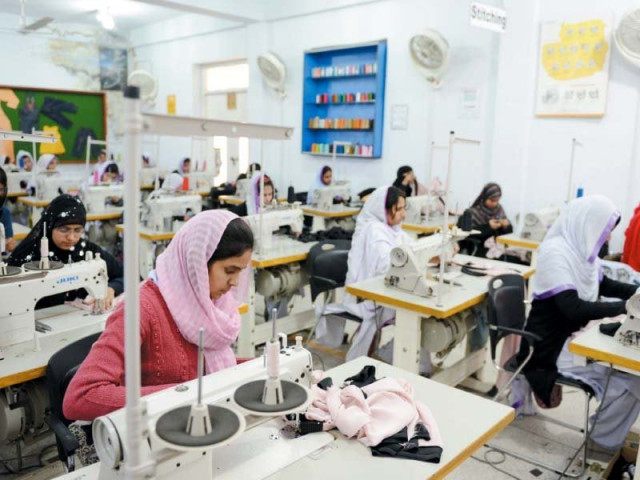Weaving away: Breaking out of poverty one stitch at a time
Ayesha has a knack for being a dressmaker and has seen her family through the toughest times

Students stitch clothes in a class at Punjab Vocational Training Council. PHOTO COURTESY: TVET RSP
On the whole, even skilled and educated women don’t end up realising their complete potential as household chores take centre stage. What many fail to realise is that possessing a certain skill and putting it to the right use can create a big difference in incomes.
Ayesha Safdar, 23, a skilled dressmaker from Lahore, is one such example. She has a knack for stitching which has helped her and the family through some of the most difficult times.
According to Ayesha, the family came upon hard times after the death of their father. She was the youngest among six sisters and one brother.
“Unfortunately, I can no longer stay in school and complete my matriculation,,” said Ayesha. “That is when I came across the opportunity of enrol at a vocational trraining centre in Samanabad.”
After going through eight months of competency-based stitching and dressmaking classes at the centre, Ayesha now runs her own training centre, teaching young girls from the neighbourhood and taking stitching orders to make ends meet.
This success story may sound simple enough, but has Ayesha faced many challenges on the way and is still trying to manoeuvre her way out of some problems.
To begin with, reaching the vocational centre to attend classes is a challenge as she has to pay for and arrange her own transport. “Even though we get a stipend of about Rs2,500 for a six to eight month course, it is hardly enough to meet the relative expenses,” Ayesha added.
Ayesha, who is now the sole breadwinner of her family, has four to five girls coming from her neighbourhood to learn the skills to stitch her orders at the vocational centre.
“Although I am making money, we barely manage as a family,” she said. Speaking about her orders, Ayesha adds customers prefer going to tailors with shops in markets. “Women who stitch at home hardly get any orders.”
“Since I don't have the space left in the house to bring in more girls, I need to get a bigger space or a shop,” she said, hoping to get some funding for her work.
Talking about future plans, the woman said that she wanted to carry on with her dressmaking training and classes so she can become a more competitive member of the industry.
Ayesha received training under the Competency Based Training and Assessment System (CBT&A) which is the latest training approach in Pakistan.
The system ensures training in quality skills so that market requirements can be met indigenously.
Through this approach, people are trained through practical demonstrations and assessed on the basis of their competence. The TVET Reform Support Programme is is funded by the European Union, the Federal Republic of Germany and the Royal Norwegian Embassy. It is implemented by the Deutsche Gesellschaft für Internationale Zusammenarbeit (GIZ) GmbH in close collaborating with the National Vocational and Technical Training Commission, TEVTA and private sector organisations. The aim is to train more than 15,500 people in competency-based skills.
Published in The Express Tribune, June 14th, 2017.



















COMMENTS
Comments are moderated and generally will be posted if they are on-topic and not abusive.
For more information, please see our Comments FAQ